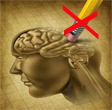Tuesday, 1 September 2015
Memory Loss in Alzheimer’s Reduced for the First Time

On November 4, 1906, German neurologist Alois Alzheimer first described the “particular malady of the cerebral cortex” of his patient Auguste D. Over a century later, this “particular malady” that now bears his name still resists every medication developed so far to treat it: none has yet succeeded in halting the progress of Alzheimer’s disease, or even in slowing it down. At best, some medications reduce some of the disease’s symptoms. In the past decade alone, an estimated $1 billion has been swallowed up by clinical trials of new Alzheimer’s medications, with almost nothing to show for them.
But after decades of disappointment, the tide may be turning at last. A preliminary study published in September 2014 by Dr. Dale Bredesen, in the journal Aging, suggests that the memory losses associated with Alzheimer’s can be reversed through an elaborate 36-point treatment program including dietary changes, exercise, intellectual stimulation and other activities that had already been recognized as Alzheimer’s prevention factors separately. But in this case, it is the unusual step of combining them that seems to have curative value.
Thus the source of this genuine revolution in Alzheimer’s treatment is not some miracle molecule, but rather a major paradigm shift regarding the very nature of the disease. In the traditional view, the best known biological markers of Alzheimer’s— beta-amyloid proteins that clump together to form amyloid plaques—have always been regarded as a toxin that causes the neurons to degenerate. But Dr. Bredesen’s team does not see things this way. Over the years, their laboratory has accumulated a substantial body of evidence leading them to believe that behind Alzheimer’s lies a breakdown in the equilibrium between one set of molecular mechanisms that promote neuronal connections and memory, and another set that promote memory loss and the forgetting of irrelevant information. According to this theory, in normal people, beta-amyloid protein facilitates this process of forgetting, but in people with Alzheimer’s, this protein gets out of control, the equilibrium is upset, and the memory-loss mechanisms take over.
In such a complex system of finely regulated biochemical reactions, a systemic approach that affects numerous molecules in the network is far more likely to be effective than a long-shot bet that a single molecule can right the entire balance. As Dr. Bredesen explains, it’s as if you had a roof with 36 holes in it, and the rain was leaking in; even if you could patch one of these holes completely, the 35 others would still be leaking.
This is no doubt why, as with other systemic treatments used to treat other chronic diseases, 9 of the 10 people who followed Bredesen’s new treatment protocol showed memory improvements 3 to 6 months after they began it, and the improvements were sustained more than two years after they began it. But this protocol was not easy to follow. It involved many changes in lifestyle, such as eliminating simple carbohydrates and processed food from one’s diet, doing yoga or meditating twice per day to relieve stress, exercising for 30 minutes 4 to 6 times per week, and taking several dietary supplements every day.
But the good news, besides the spectacular improvements in memory (which still have to be reproduced with a larger sample), is that the main side effects of this treatment were a better body mass index and better health in general. As side effects go, you could do a lot worse!
![]() Memory Loss Associated with Alzheimer’s Reversed for First Time
Memory Loss Associated with Alzheimer’s Reversed for First Time
![]() Reversal of cognitive decline: A novel therapeutic program
Reversal of cognitive decline: A novel therapeutic program








I just came across this very GREAT blog. I love the beginner, intermediate, advanced levels. A great concept that I’m sure takes a lot of effort on a subject that’s constantly changing.
I wanted to let you know that I very much appreciate the efforts made and will be donating.